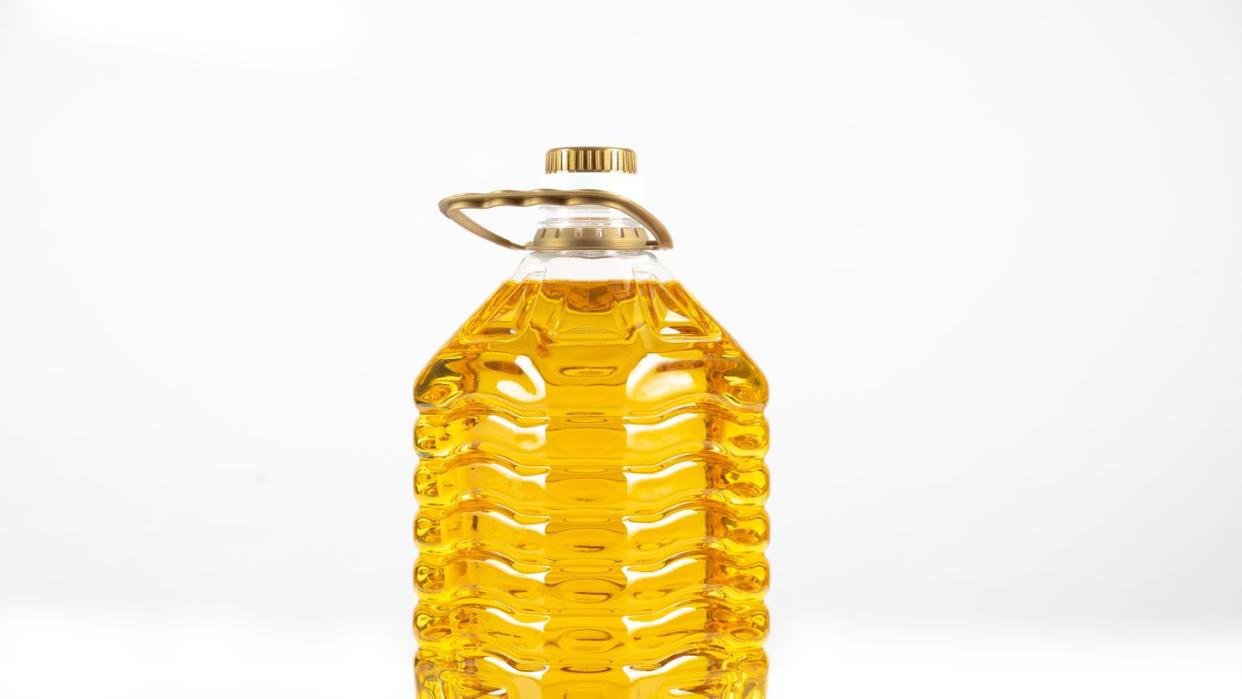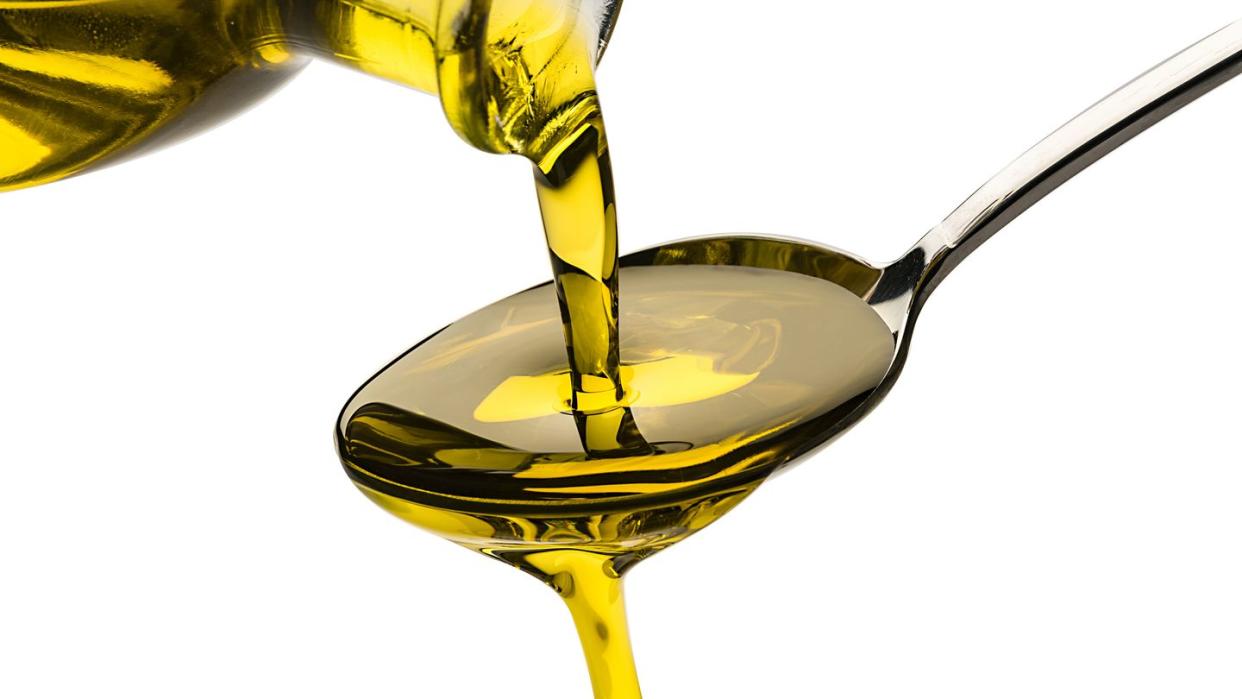We Need To Talk About The Dangers Of Seed Oils

"Hearst Magazines and Yahoo may earn commission or revenue on some items through these links."
If you spend any time following health trends on social media, you’ve probably heard some unkind words about seed oils. They've come from the likes of Joe Rogan, holistic mommy bloggers, and motivational lifestyle gurus. And they have all reached the same conclusion: seed oils are toxic and cause inflammation that leads to heart disease and cancer.
Scared yet? We don’t blame you. Seed oils comprise a large section of the oil aisle at the supermarket: sunflower, canola, grapeseed, corn, peanut, and soybean (which is vegetable oil, by the way.) And it’s used in just about every packaged food product on the market. Seed oil is an inescapable ingredient.
But before you throw away your bottle of canola oil, we’re here to separate fact from fiction. Are seed oils actually toxic? What do they do to your body? Is there anything we should be using instead?
We consulted doctors and health experts to unpack exactly what role seed oils should play in your diet—so you don’t have to rely on social media influencers for important health information.
What Makes Seed Oils Different From Other Fat Sources?

To transform any ingredient into a cooking oil, processing and refinement are necessary steps. Filtration and purification isolate the fat from the remaining ingredients, neutralizing the flavor and increasing the smoke point. But not all oils are created equally.
Extra virgin olive oil, for example, is cold pressed with minimal processing. It maintains the naturally fruity flavor of the olive, which makes it a great choice for salad dressings and dipping bread. But it's not the ideal pick for cooking over high heat or recipes where you want a more neutral flavor. The more delicate production process also means that olive oil is typically more expensive than more refined fat sources.
Seed oils, on the other hand, go through a more extensive refining process. They're neutral in flavor, can hold up to nearly any cooking method, and they're often affordable enough to use for deep frying. But the processing steps to get all of these benefits come with a cost—they remove most of the oil's nutrient density.
"The more processing you go through, the more likely you're bringing down all the benefits of the actual content of the fruit or seed," says Dr. Amy Lee, Head of Nutrition for Nucific.
But What About Omega-6?

The primary gripe from seed oil skeptics has to do with one particular chemical structure: omega fatty acids. There are three types that you can find in all foods, omega-3, omega-6, and omega-9. Omega-3 is by and large the most coveted fatty acid, but that doesn't mean the others are bad for you.
According to Harvard Medical School, each type of omega fatty acid contributes something important to your overall body function. Omega-6, which is the most dominant fatty acid in most seed oils, can help lower the levels of harmful cholesterol and regulate insulin production. But this type of fatty acid has become enemy number one among seed oil haters.
But why do people dislike Omega-6 so much? "In your daily nutrition requirements, you do need a level of all the omegas," Dr. Lee explains. "But what happens is that we tend to eat way too much of the omega-6 and omega-9."
That doesn't mean seed oils are bad—it just means our diets aren't balanced.
"Anything in moderation is key. Current nutrition guidelines show that you can eat eight to 10% of your daily fat intake with omega-6," says Dr. Lee. "To truly avoid it is almost impossible, just like with trans fats."
Do Seed Oils Really Cause Inflammation?

Seed oil critics blame the ingredient as the source of your body's inflammation, which causes increased risk of heart disease and cancer. "Look throughout human history," Joe Rogan argued on his podcast, "there’s never been a time until recently when people got oil directly from plants in large quantities like that."
Sorry, Joe, but that's not exactly true. Rapeseed oil, the predecessor to canola oil, has been used for culinary purposes in Asia since as early as 2000 B.C.E. The inflammation argument is ultimately a bit of a stretch. Seed oils may cause some body inflammation, yes, but so does air pollution and general stress.
"Most people don't even understand the idea of inflammation in general," Dr. Lee argues. "Inflammation is one of those things where your body reacts to everything around you—the environment, your psychological state, your well being. Then this inflammatory marker goes up and it's just basically a little warning light almost saying 'Hey, something is not right.'"
The effects of this inflammation don't manifest right away. People with higher levels of inflammation are generally more susceptible to developing conditions sooner than people without. But seed oils are not the primary cause, and "healthier" oils are not the primary solution. You can reduce inflammation by eating more fruit, managing your stress, and even just getting a good night's sleep.
What Should You Use Instead?

If you're eating a balanced diet, odds are you don't need to cut out seed oils. Unless you regularly deep fry your food, you're typically only using a few tablespoons a day at most. But if you're interested in using fat sources with higher nutrient densities, there are plenty of options.
Dr. Kellyann Petrucci, celebrity nutrition expert and New York Times bestselling author, encourages the use of fats when cooking. "It's important you eat fats, like the fats in healthy oils, because the body needs fats to absorb fat-soluble vitamins like A, D, E and K," she says. "Fat also contributes to satiety and is beneficial for heart health."
In particular, she recommends using olive oil, avocado oil, macadamia nut oil, flaxseed oil, and fish oil if you're looking for a healthier source of fat.
If you're looking to increase your omega-3 intake, you can accomplish that without abandoning seed oils entirely. Dr. Lee takes a daily fish oil supplement as a sort of safety net, since our nutritional intake varies day by day. You can also eat more eggs, fish, and nuts to incorporate more omega-3 fatty acids into your diet.
You Might Also Like
